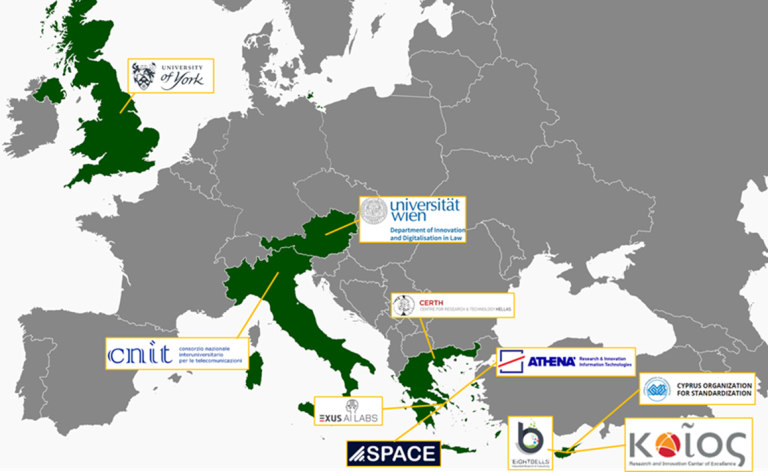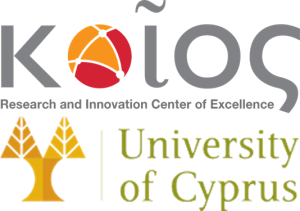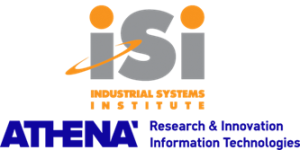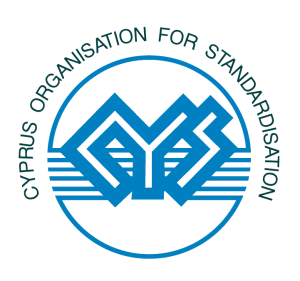The GuardAI Consortium brings together researchers and industry partners from across the EU to develop innovative solutions to address AI security challenges in high-stakes applications.


The University of Cyprus (UCY) is the oldest and largest public university in Cyprus, and participates in this proposal via the KIOS Research and Innovation Center of Excellence (KIOS CoE). The KIOS CoE operates within the University of Cyprus and was established in 2008, advancing into a European Research and Innovation Center of Excellence in 2017. It is the largest research and innovation center in Cyprus and conducts research and innovation activities emphasizing monitoring, control, management and security of critical infrastructures. The goal of the Center is to conduct outstanding interdisciplinary research and innovation and produce new knowledge and tools that can be applied to solve real-life problems.
For GuardAI, KIOS CoE will develop algorithms for enhancing the robustness of machine learning models and will also lead the use-case related to surveillance and monitoring with AI-enabled drones to showcase the solutions.

The Industrial Systems Institute (ISI) was established in Patras, Greece, in 1998. It is a leading R&D organization of excellence conducting basic & applied research and exploratory development on Information and communications technology (ICT) for the Greek and European industry. ISI has been part of the Research and Innovation Centre in Information, Communication, and Knowledge Technologies “ATHENA”, since 2003. ATHENA is involved in the GuardAI project through ISI’s Autonomous Interactive Systems and Machine Intelligence group. Founded in 2019, the group employs 20 research staff members, and brings its extended expertise in machine learning, signal processing, and computer vision in applications related to autonomous driving, cyber-physical systems and human-robot collaboration. Over the past five years, the group has co-led or contributed to over 10 EU and national projects, collaborated on three industrial subcontracts with Panasonic Automotive Europe, and published more than 100 papers in international journals and leading conferences.
ATHENA has the overall technical oversight of the project and will contribute to GuardAI with cutting-edge AI-empowered solutions for high-performance, efficient, robust, and resilient multimodal cooperative perception in connected and autonomous mobility (UC3).

The Centre for Research and Technology-Hellas (CERTH) is the only research centre in Northern Greece and one of the largest in the country founded in 2000. It is a legal entity governed by private law with non-profit status, supervised by the General Secretariat for Research and Innovation (GSRI) of the Greek Ministry of Development and Investments. Its mission is to promote the triplet Research – Development – Innovation by conducting high quality research and developing innovative products and services while building strong partnerships with industry and strategic collaborations with academia and other research and technology organisations in Greece and abroad. CERTH consists of five (5) Institutes and the Central Directorate and is governed by its Board of Directors. The institutes are: the Information Technologies Institute (ITI), the Chemical Process & Energy Resources Institute (CPERI), the Hellenic Institute of Transport (HIT), the Institute of Applied Biosciences (INAB), and the Institute of Bio-Economy and Agri-Technology (iBO).
The Information Technologies Institute (ITI) is one of the leading Institutions of Greece in the fields of Informatics, Telematics and Telecommunications, with long experience in numerous European and national R&D projects. It is active in a large number of application sectors (energy, buildings and construction, health, manufacturing, robotics, (cyber)security, transport, smart cities, space, agri-food, marine and blue growth, water, etc.) and technology areas such as data and visual analytics, data mining, 5G/6G, SDN, machine and deep learning, virtual and augmented reality, image processing, computer and cognitive vision, human computer interaction, IoT and communication technologies, navigation technologies, cloud and computing technologies, distributed ledger technologies (blockchain), (semantic) interoperability, system integration, mobile and web applications, hardware design and development, smart grid technologies and solutions and social media analysis.
Within the scope of the GuardAI project, CERTH-ITI will contribute to the enhanced protection and security-by-design principles for secure Edge AI, and use case implementation, evaluation, and demonstration.

The University of Vienna, founded in 1365, is the oldest public research university in the German-speaking world and one of Europe’s largest institutions of higher education. In October 2017, the Department of Innovation and Digitalization in Law was established within the University’s Law School to address the emerging legal challenges posed by rapid technological advancements.
The Department serves as a nexus between legal scholarship and the digital revolution, focusing on critical areas such as information technology law, intellectual property law, privacy and data protection, copyright, e-commerce, consumer protection (from European and comparative perspectives), and Legal Tech innovations.
Committed to an interdisciplinary approach, the Department actively collaborates on multidisciplinary research projects, particularly in healthcare and law enforcement, to deliver comprehensive solutions to the legal, ethical, and societal questions stemming from technological progress.
The Department of Innovation and Digitalization in Law ensures that GuardAI Consortium adheres to legal, ethical, and data protection regulations, including the European Charter of Fundamental Rights. UNIVIE also offers guidance on ethical considerations in project research and identifies potential regulatory challenges for implementing GuardAI solutions.

CNIT (National, Inter-University Consortium for Telecommunications, www.cnit.it) is a non-profit consortium, established in 1995, bringing together 42 public Italian universities to perform research, innovation and education/training activities in the field of the Information and Communication Technology. CNIT operates 50 Research Units, one for each member university, plus eight other units belonging to institutes of the National Research Council (CNR, the largest public research institution in Italy) that reached a cooperation agreement with CNIT. CNIT also operates eight National Laboratories: Photonic Networks & Technologies (located in Pisa); Radar & Surveillance Systems (located in Pisa); Multimedia Communications (located in Napoli); Smart, Sustainable and Secure Internet Technologies and Infrastructures (located in Genova); Wireless Communications (located in Bologna/Cesena/Ferrara); Network Assessment, Assurance and Monitoring (located in Rome); Context – Oriented Networking (located in Catania/Cosenza/Palermo/Reggio Calabria). More than 1,300 professors and researchers, belonging to the member universities, collaborate within CNIT, together with more than 115 CNIT own employees. CNIT participated in hundreds of research projects, including EU coordinated projects, ERC grants and Italian nation-wide initiatives. In H2020 European program the CNIT has obtained 61 projects and coordinated 15 of them, while in HORIZON EUROPE the CNIT has obtained 24 projects and coordinated 9 of them. CNIT has also a significant experience in the organization of scientific events and conferences.
CNIT will contribute to the application-level resiliency framework leveraging federated and split learning to enhance privacy, security, and reliability in a data-intensive context like drone imagery processing. Based on a resilience analysis and deficiencies identified of AI systems for object recognition, CNIT will design new “security” functions to mitigate these threats at the AI level. CNIT will define and evaluate the robustness of the enhance AI-system in UC1.

SPACE HELLAS S.A. is a dynamic, leading System Integrator and Value-Added Solution and Service Provider, based in Athens (Greece). The company – certified according to ISO 9001:2015 quality standard and ISO 27001:2013 for its information security management system – mainly focuses on System integration, surveillance and security systems and services, telecommunication services at national and international level, IT Applications and Services. SPACE Hellas S.A. R&D Department has extensive experience in the field of various domains including cybersecurity, software development and integration through its participation in many EU, ESA, and National collaborative R&D projects, as well as in national large-scale system integration projects, for which it develops cutting-edge technologies, products and services for the enterprise, government and defence sectors.
In GuardAI, SPACE Hellas S.A., is leading Use Case 2 for Protecting Decentralized 5G Network Analytics, by developing cutting-edge AI techniques.
EXUS AI Labs, the R&D department of EXUS, is where we design and develop robust and trustworthy AI solutions that allow us to leverage the untapped potential of big data analytics across multiple verticals. For more than 35 years, EXUS has gained substantial experience in managing research activities, from the ideation to the realisation phase, taking advantage of a highly professional and diverse team. Currently, EXUS AI Labs coordinates and participates in projects funded under EU Research and Innovation Programmes, such as Horizon Europe and European Defence Fund. Our department is developing AI solutions for numerous large-scale Research and Innovation Projects in various sectors such as Security (Physical and Digital), Health, Defence and Creativity with our core competence being around AI, data analytics, real-time systems engineering, complex event processing, and large-scale cloud implementations.
Within GuardAI, EXUS is responsible for the development of the AI Defence Recommender, a tool aiming to fortify edge AI systems against evolving challenges while enhancing their reliability and integrity.

Eight Bells stands as a pioneering independent high-tech enterprise, based in Nicosia, Cyprus and in Athens, Greece dedicated to pioneering advancements in Information and Communication Technology. Our expertise spans diverse technological fields, including 5G/6G Telecommunications, Cybersecurity, and Artificial Intelligence. At the core of our offerings lie custom-designed solutions tailored to meet the demands of emerging technologies. The company also designs and builds high-performance thermal cameras for various industrial and security applications, ensuring precise and reliable thermal imaging solutions.
The company’s multidisciplinary team of experts is committed to bridging the gap between academic research and practical applications, transforming innovative ideas into impactful technological solutions. Whether helping organizations enhance their digital infrastructures or providing strategic guidance, Eight Bells is dedicated to driving technological progress and improving operational efficiency for its clients. With a rich background in system engineering, R&D consultancy, and network design, we actively participate in and have led numerous Horizon, EDIDP/EDF, ESA, and National-funded research initiatives.
Eight Bells acts as the Work Package leader for Dissemination, Exploitation and Certification roadmap (WP5), overseeing the project’s overall communication and developing the exploitation strategy to ensure impactful outreach and engagement. Additionally, Eight Bells contributes significantly to the project’s technical aspects, including the elaboration of Use Cases and system requirements analysis, the design of the overall architecture, and conducting risk analysis and threat modeling.

Cyprus Organization for Standardization (CYS) is the National Standardization Body of Cyprus, and a full member of international and European standardization bodies, including: ISO (International Organization for Standardization), ITU (International Telecommunication Union), CEN (European Committee for Standardization), CENELEC (European Committee for Electrotechnical Standardization), ETSI (European Telecommunications Standards Institute).
CYS’s mission is to effectively represent Cyprus in the global standardization landscape, advancing the national interests in international and European standardization activities. It focuses on promoting standards that enhance the competitiveness of Cypriot businesses, ensure consumer protection, and safeguard environmental sustainability and public health. CYS is responsible for the management of the National Standardization System, which includes developing national standards and annexes of European Standards and facilitating the public enquiry of draft European and International standards.
CYS leads the standardization efforts within the GuardAI project by coordinating the review of the existing state-of-the-art included in European and International standards related to AI robustness, by providing training on standardization processes, by linking the project with the European and international ecosystem aiming to influence the development and revision of standards for AI security and robustness, and by providing a standardisation and certification roadmap for the project outputs.

The University of York (https://www.york.ac.uk) is one of the UK’s leading research-led Universities and a member of the prestigious Russell Group, which is made up of the top 24 research-led institutions in the UK. The University has about 30 Departments or centres, most of which were rated internationally leading in the last Research Assessment Exercise (RAE), and it is consistently rated at the top of teaching leagues. York is the UK’s leading academic centre of expertise in mid-technical readiness level research for software-intensive systems, both through technology transfer onto projects and through education and training. The Automated Software Engineering research group within the Department of Computer Science of the University of York is at the forefront of developing tool-supported methods for the engineering of dependable and trustworthy AI-enabled cyber-physical systems.
YORK, building on its expertise in testing and verification of AI, will develop uncertainty quantification algorithms for AI models, enabling anomaly detection and identification of adversarial inputs.
